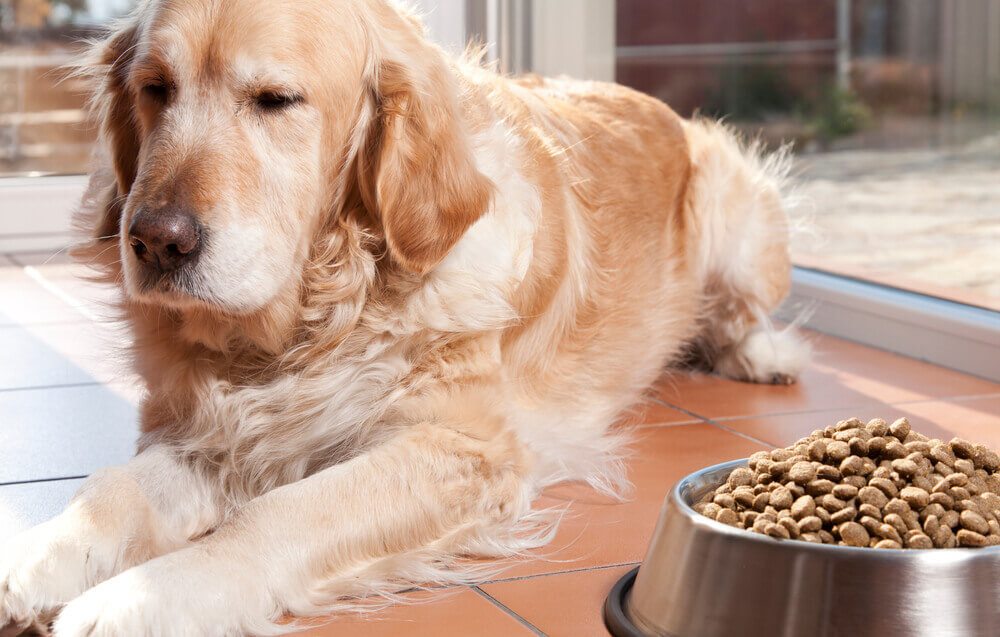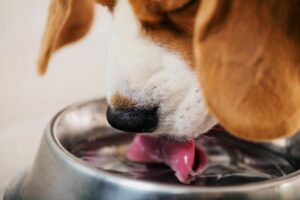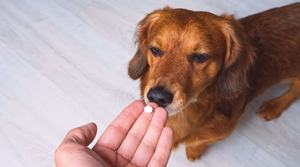It can be scary when your pet dog suddenly stops eating. But if you’re a dog owner, chances are it will happen at some point. The important thing is to be prepared and not panic.
Three main home remedies for a sick dog not eating include:
- fasting for 12-24 hours;
- eating foods that are bland and/or easy to digest;
- making sure your dog stays hydrated.
In this post we cover everything you need to know about this topic, including the answers to some frequently asked questions.
Keep reading to learn about why your dog might not be eating, the symptoms of an upset stomach, and a wide variety of home remedies you can try to fix the problem.
Why isn’t my dog eating?
There are two main reasons why a sick dog may not be eating. Either, they have an upset stomach or loss of appetite.
Figuring out the reason why your dog is sick can take some detective work, especially when healthy dog suddenly stops eating suddenly. To simplify the process of figuring it out, here are some common explanations for both an upset stomach and loss of appetite in dogs.
What causes upset stomach in dogs?
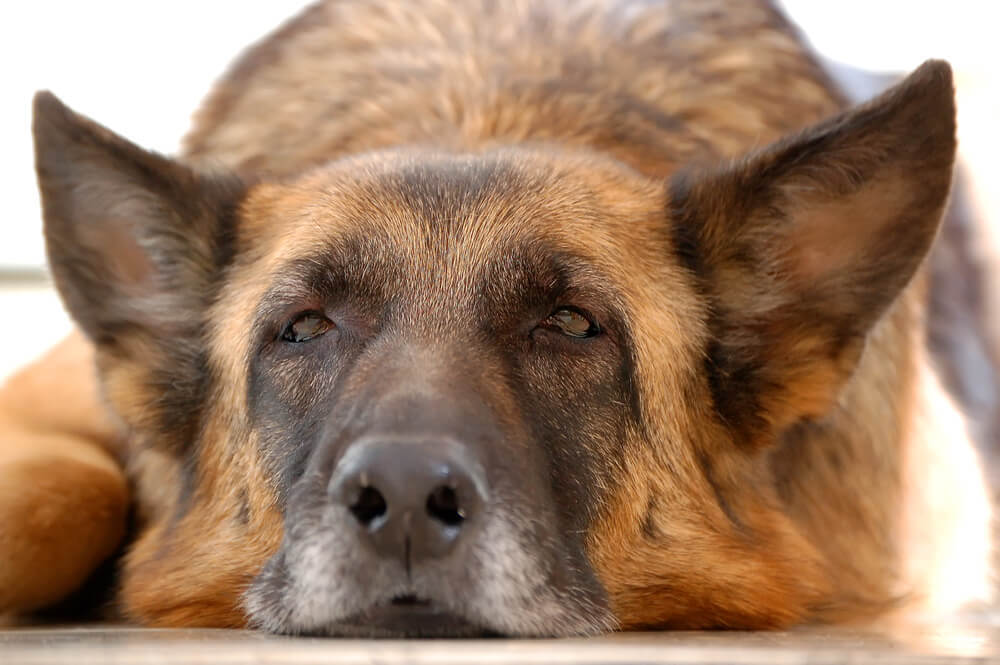
1. Changed dog food
According to the American Kennel Club,
Switching your dog’s food abruptly can cause gastrointestinal upset such as vomiting, diarrhea, and a decreased appetite.
If you switched your dog’s food suddenly, either because you didn’t know this or perhaps due to a supply issue with their regular food, it’s okay.
If possible, it’s always best to gradually shift your dog from one diet to a new one like this:
- 75% old and 25% new food for two days
- 50% old and 50% new food for two days
- 75% new and 25% old food for two days
- Then continue with 100% new food
This method allows your dog’s system slowly to transition to their new food, so they don’t get sick. Using this approach can also help you pinpoint if there are any allergy or sensitivity issues with your dog’s new food.
If your dog has any reactions like vomiting or diarrhea while transitioning to a new food, consult your vet for dietary advice. Some dogs may also need to make this transition over a longer period in order to adjust properly to their new food.
2. Dehydration
If your dog is nauseous and not eating or drinking, they may be lacking important hydration they normally get from their daily food and water intake.
Some signs of dehydration to watch out for include:
- Lethargy
- Panting
- Sunken eyes
- Dried gums
- Weakness or collapsing
- Loss of skin elasticity
When your dog has an upset stomach, including symptoms like vomiting and diarrhea, they can dehydrate quickly. It’s important to find some way to keep them hydrated.
If you fear that your dog is becoming severely dehydrated, a vet or emergency animal hospital can put them on a fluid drip.
Sometimes dogs can get an electrolyte supplement to aid with hydration and give them important nutrients like sodium and potassium to ensure regular bodily functioning when they aren’t eating much.
3. They ate something they shouldn't have
Some dogs will eat literally anything! From garbage and plants, to food that’s left out and even their own vomit, dogs have a way of getting into (and ingesting) things that they shouldn’t.
You always need to have your guard up to make sure your dog doesn’t ingest anything that makes them sick, but sometimes things happen.
If your dog ingested a foreign object and you aren’t sure what it is, it’s important to see your vet or call a 24-hour emergency clinic for advice.
Your dog may need x-rays and/or an endoscopy to remove anything potentially harmful from the stomach, so it’s best not to wait it out at home in this situation.
4. Chronic conditions such as food sensitivities
Other potential reasons for your dog’s upset stomach are chronic conditions like food sensitivities or allergies.
If your vet suspects that the issue is food related, your dog may need to try an elimination diet to pinpoint the cause.
5. Bacterial imbalances within the digestive tract
Dogs who suffer from chronic diarrhea sometimes have a condition called small intestinal bacterial overgrowth (SIBO). When left untreated, your dog’s digestive system may not be able to absorb the nutrients in their food so even if they are eating, they still lose weight.
Treatment for dogs with this type of bacterial imbalance is usually antibiotics, sometimes along with a special diet.
What causes loss of appetite in dogs?

1. Recovering from surgery
It’s normal for a dog who has just had surgery to have a below-average appetite. If they are staying hydrated, it’s okay if your dog skips a meal or two.
Start by offering them half of their normal meal. If they eat that and still seem hungry, you can feed them the rest in about an hour. Slowing down their feeding can reduce strain on your dog’s digestive system while they heal.
2. Stress
Stress is another common factor that can lead to appetite loss in dogs. Two common stressors for dogs are fear (of things like loud noises, other people, new situations, etc.) and separation.
Pinpointing the cause of your dog’s stress and finding ways to mitigate it should lead to an improvement in your dog’s appetite.
3. Ageing
Aging is a big reason for loss of appetite in dogs for several reasons. They may be suffering from cognitive decline such as confusing or memory loss, as well as less sense of smell and taste. They may find their food less appealing, causing them to eat less.
If you're interested in making dry kibble food more palatable for your dog, check our resource guide on How To Make Dog Food More Appealing here.
4. Illness, infection or disease
Your dog’s loss of appetite could also be due to an underlying health condition, like pancreatitis. When we humans are sick, we often find it hard to keep up an appetite. The same goes for our pups.
If you can’t figure out why your dog isn’t eating, seeing a vet to diagnose and treat any possible illnesses or diseases can help.
Symptoms of an upset stomach in dogs
If your dog has an upset stomach, they may exhibit one or several of these symptoms:
- Vomiting
- Loss of appetite
- Eating grass or licking the floor
- Diarrhea
- Eating grass or licking the floor
- Gas
- Salivation
- Stomach making gurgling noises
What (foods) do you feed a sick dog with no appetite?
- Banana baby food
- Canned pumpkin
- Bland diet: white rice (not instant rice) with boiled chicken
- Chicken and/or bone broth
- Plain oatmeal
- Cooked sweet potatoes
Why is my dog not eating but drinking a lot of water?
It’s not unusual for dogs to go 12 - 24 hours without eating.
If they are still drinking water, they may just have an upset stomach from eating something bad or a gastrointestinal infection that will pass.
7 Other Remedies for Upset Stomach in Dogs
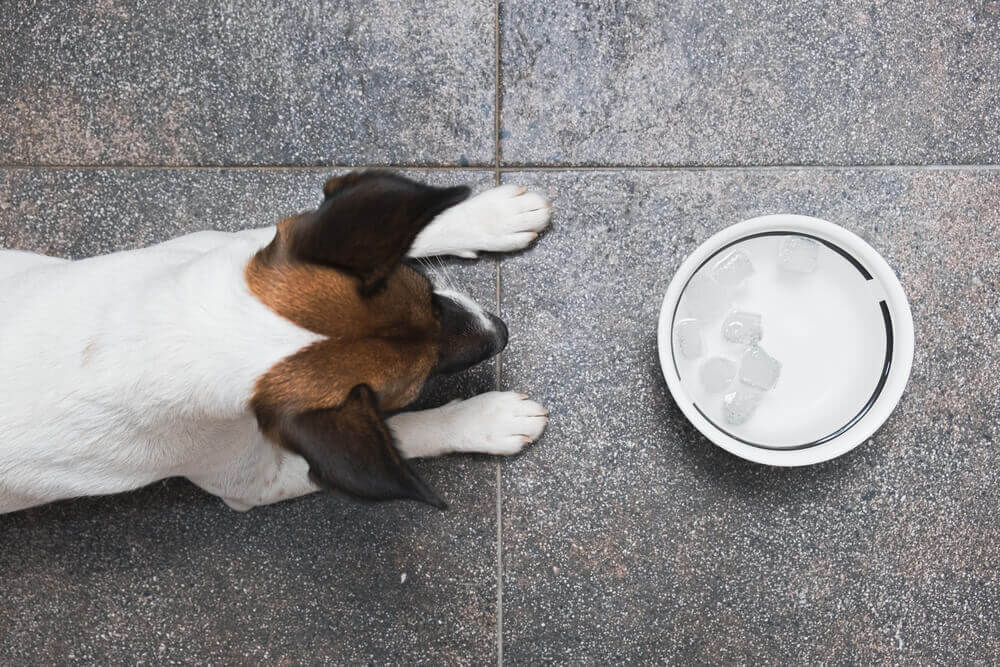
1. Ice Cubes
If your dog is recovering from surgery or vomiting a lot and struggling to keep down liquids, ice cubes is a way that vets recommend keeping your dog hydrated.
Licking the ice cubes allows them to get hydration in small amounts that may be easier for their stomachs to handle.
2. Hydration
Adding water to your dog’s dry food or serving them a tasty broth are a couple of other ways that you can encourage a sick dog to rehydrate and take in some important nutrients.
We've written an extensive article on how to trick your dog into drinking more water, if you're looking for novel ideas to get your ailing dog to keep hydrated.
3. Fasting 12-24 hours
When your dog won’t eat it’s easy to feel worried and desperate for something to work. However, you need to trust that your dog knows what’s best for themselves sometimes. It’s okay for your dog to fast for 12-24 hours when they are feeling sick.
If they go without food for much longer that’s when you need to start worrying, contact your vet, and/or try more home remedies.
There are other health benefits to fasting your dog as other dog owners can attest to and that's to eliminate toxins, promote weight loss, cancer prevention and improved health and brain function.
4. Probiotics
Probiotics have been shown to improve gastro-intestinal health in dogs. Feeding probiotics to dogs improves stool quality and has also been shown to aid dogs with acute diarrhea.
It is sold online or in stores and contains live bacteria in sufficient numbers.
5. Heating up your dog’s food
An uncommon but sometimes helpful trick for getting your dog to eat is by warming their food. Not only is warm food more appealing to dogs, it can also help bring out it’s natural aromas and flavors, making it more palatable.
Just make sure that the food is heated through evenly and isn’t too hot for your dog to eat. You may heat your dog’s food using a microwave, by placing the food in a plastic bag and letting it sit in hot water, or by mixing a little hot water directly in the food.
6. Use wet food
Wet food typically contains a lot more moisture than dry kibble. If your dog is usually on a dry food and drinks a lot of water but isn’t eating or drinking because of an upset stomach or lack of appetite, trying a wet food may bring you some success.
In addition to the moisture, wet food is often considered more palatable to dogs and closer to their natural diet than dry kibble.
7. Eating grass
You may have noticed that when dogs aren’t feeling well, they sometimes eat grass. While it may seem unusual to us this behavior can be helpful (in moderation).
The reason why it helps is because grass is high in fiber. By increasing their fiber intake in this way, your dog can digest whatever they ate that caused their upset stomach and pass stool easier, getting it out of their system.
Dr. Lori Teller, a clinical associate professor at the Texas A&M College of Veterinary Medicine & Biomedical Sciences suggests that grass acts like a mild laxative or trigger vomiting and that aside from fiber, eating grass
may provide some micronutrients, such as vitamins A and D.
If in doubt, visit a vet
If none of these remedies work and you notice any of the following: your dog stops drinking, develops a fever, is lethargic, vomiting, or has diarrhea, contact your vet to do a thorough examination of your dog.
What home remedies have worked to soothe your dog’s upset stomach? Please share in the comments below.

